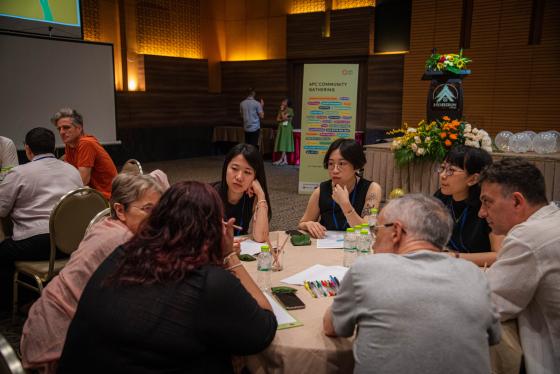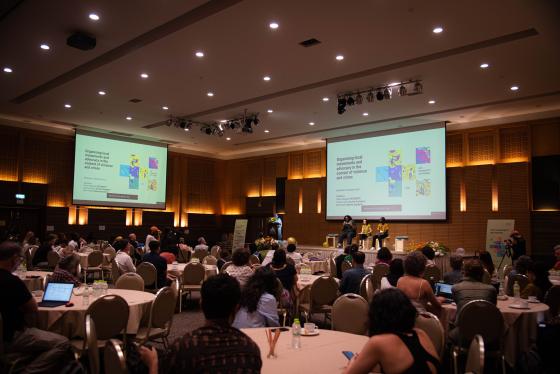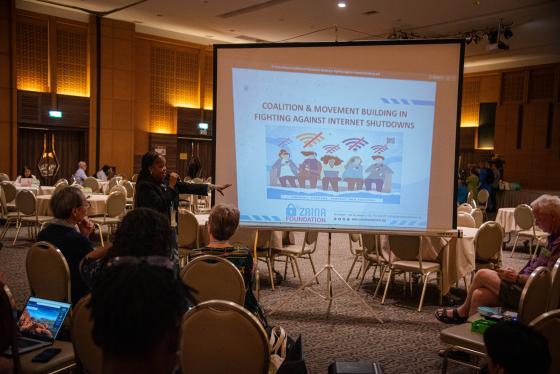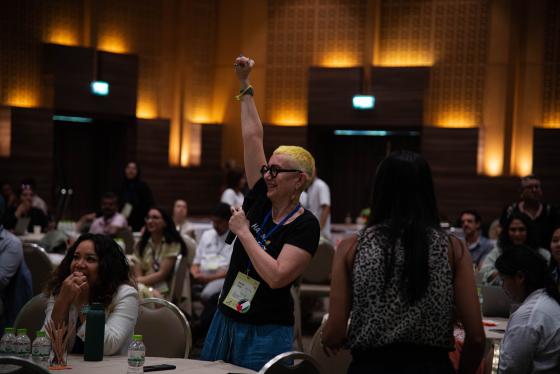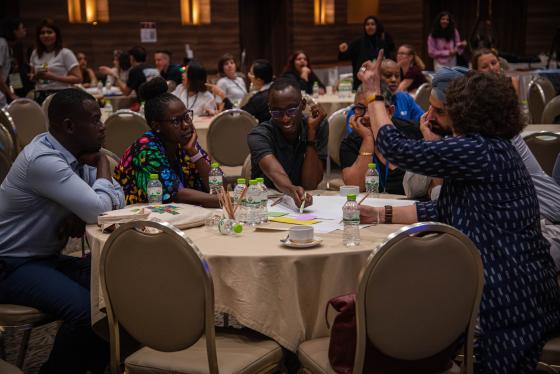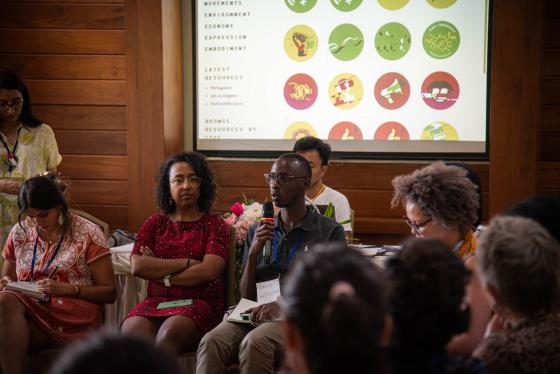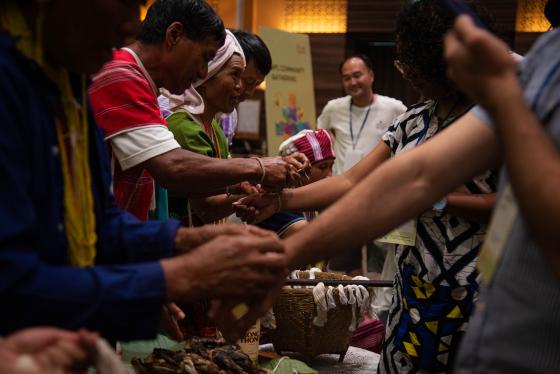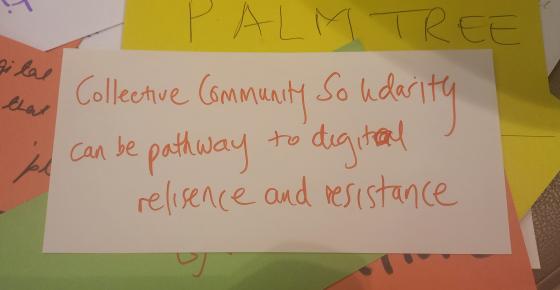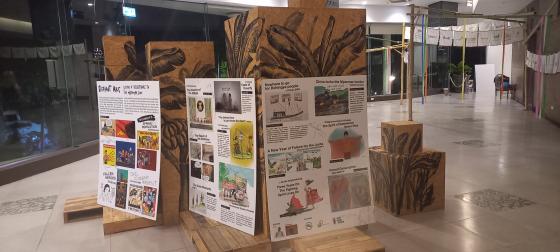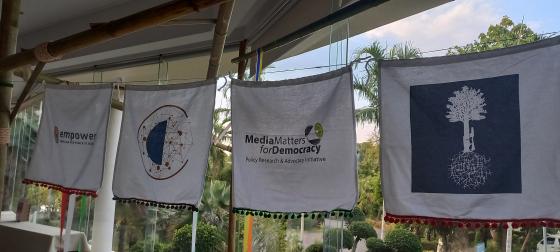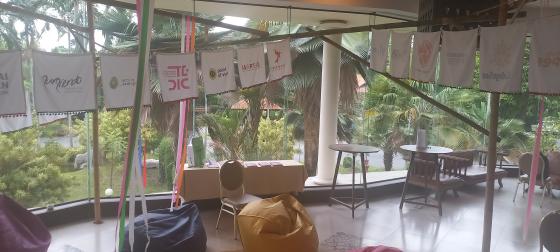The APC Community Gathering took place from 15 to 17 May 2024 in Chiang Mai, Thailand, bringing together APC member organisations’ representatives, associates, close partners and allies, including civil society organisations based in Thailand, and the APC team. Over 225 people assembled from 46 countries and participated in 43 events, including plenaries, participant-led sessions and regional meetings, 40 lightning talks, presentations, pop-up sessions and project meetings, and several social events, including film screenings.
Due to the global COVID-19 pandemic, this convening came after a gap of seven years rather than the usual three years that the network meets face to face. The theme of the gathering was “More Together” and we celebrated being able to be, to do, to plan and to dream “more together”, as well as acknowledged and missed those unable to join us in person. We made significant advances towards our shared vision in this crucial moment and enjoyed a significant boost in networking, learning and collaboration across the APC network.
Starting with seven organisations in 1990, APC now comprises 70 organisational members and 41 associates active in 74 countries. The network emphasises a shared political narrative and vision – as one member said at a plenary, “APC is my political home.” The gathering offered all of us a timely and unique opportunity to learn from each other, to build shared meanings and to shape our collective advocacy strategies for the next four years, drawing on APC’s 2024-2027 strategic plan.
“The value of the APC network is the space it gives to find community, collaboration and camaraderie with other digital rights actors globally. We work in the Asia Pacific and it’s always nice to have a space to find and share learnings, challenges, solutions with those in other regions.”
–Sara Pacia, EngageMedia (Indonesia)
The centrepieces of the gathering’s programme were the five plenaries that anchored all discussion and built a shared narrative of how we can work together to leverage the current moment and defuse brewing challenges. The first plenary explored what forms of collective action are needed for the APC network to deepen its collective impact as well as how can it strengthen its collective identity while recognising its diversity. The second plenary showcased strategies for local movements and advocacy in times of violence and crises, while the third focused on ensuring digital technologies enable gender justice, environmental justice and digital inclusion. The fourth plenary discussed pathways to digital resilience and resistance in the context of climate change, conflicts and an anti-rights wave. The final plenary helped to synthesise the last three days to share common insights, the collective action needed and next steps within the framework of APC’s new strategic plan.
“The most important aspect for us being a member of APC is being able to get a global perspective on things that are affecting us in the part of the world where we work, getting to hear from other people in other parts of the world, what they’re facing and seeing where there are commonalities and coming up with solutions to solve some of those challenges.”
–Peter Bloom, Rhizomatica (Mexico)
Alongside the plenaries, there were several dozen sessions and talks co-designed by the participants, including ones on gendered disinformation, meaningful connectivity, big tech accountability, feminist principles of the internet, the safety needs of Myanmar women, AI, tech-life balance, internet shutdowns, hate speech, climate crisis and more. There were also regional meet-ups of members focused on Africa, Asia, Latin America, MENA, and Europe and North America. There were capacity-building sessions on human resources and communications, as well as daily self and collective care activities. Finally, participants also presented lightning talks and pop-up sessions, including on imagining feminist connectivity during crisis, decolonising the internet, Open Fibre Data Standard (OFDS), fair jobs and quality of life for women working in the digital sector, digital freedoms censorship, etc.
Apart from the formal sessions in the programme, the gathering also offered a Community Village space for self-organised interactions between participants without any pre-scheduled programming. The Village included the Cinema à la carte space to watch some of the network’s audiovisual productions; the Kiosk for participants to exhibit a wide variety of materials such as books, reports, brochures, publications, postcards, stickers, gifts, etc.; the Plaza for spontaneous gatherings and interactions; and the Museum for visual displays, such as posters, artwork, artefacts and photos.
“Our involvement in the APC network has a two-sided advantage. On the one hand, we know other organisations trying to link digital issues with environmental and social issues, which enables mutual learning. And we also believe that all of our accumulated work on understanding environmental problems from a structural perspective, and therefore from the perspective of finding real solutions, could also be advantageous for APC organisations that are beginning to address environmental issues. Above all, [the network] is a way of working jointly to find solutions for the multiple crises that humankind and the planet are facing at this moment in time.”
– Ivonne Yanez, Acción Ecológica (Ecuador)
Collective insights and actions
The final plenary held an exercise to assess and digest the learnings from the gathering and move towards collective action and specific next steps. The group brainstormed on what had changed or been confirmed in the participants' thinking of collective action in the last few days, and what actions we need to take as a network moving forward.
The synthesis of this final plenary provided deep insights and key takeaways for the whole network that emerged from the collective brainstorming.
It was acknowledged that the APC network is impacted by several significant developments and changes in context, some of these including the expansion of digital capitalism and big tech power since the COVID-19 pandemic, the climate crisis, increasingly authoritarian states shrinking civic space, and the criminalisation of human rights defenders. Complicity between states, corporations, and violent non-state actors, alongside the rise of anti-rights agendas in UN spaces, were emphasised as changes that further the complexity of the rights landscape, added to global crises, from Palestine to Myanmar to Congo and beyond, which underscore the continued profitability of violence.
There was agreement on the fact that collective action is essential in this context, and that the network must go beyond frameworks that focus only on individual rights, advocating for digital justice and incorporating community and environmental rights. It was also flagged how crucial it is to articulate the relationship between digital rights, human rights and the rights of nature, and to imagine new rights grounded in these intersections. Addressing corporate power, particularly big tech, was deemed as a priority, while engaging deeply with Indigenous communities and activists was also mentioned as non-negotiable to ensure their voices are integral in discussions about Indigenous rights and environmental justice.
Participants concurred that advocacy needs to adopt an ecosystem approach, working at multiple levels and spaces with real examples to influence regulators and policy makers. It was highlighted that for this, the network must be prepared to confront anti-rights actors in UN spaces while leveraging civil society’s power in multilateral spaces. The APC community agreed that advocacy should be both disaggregated and intersectional, collaborating on distinct issues while articulating their interrelations to avoid siloed perspectives. To achieve this, collaboration with governments, the private sector and other social movements is key, as is avoiding reliance on big tech infrastructure for organising.
There was consensus that moving forward, the APC network needs to continue to work together from a shared political agenda and vision, rooted in diverse communities and prioritising marginalised voices. Within this, quick responses in emergencies, amplifying members’ work, and maintaining dialogue and communication were defined as essential, as well as collectively strategising on how to engage in problematic spaces, develop joint policy positions and deepen connections between advocacy processes. Other crucial steps mentioned were increasing membership from underrepresented countries, focusing on marginalised communities and fostering frequent convenings to build relationships and resilience.
Finally, the network agreed that it needs to map its own capacities, strengths and opportunities for joint action, which should happen as we strengthen regional strategies and improve how we share knowledge to learn from each other’s experiences.
This last plenary proved an appropriate conclusion to the three days of the Community Gathering, providing productive and crucial actions to ensure a clear and fruitful path forward for the network.
Gaurav Jain is lead editor at APC. He is an award-winning editor, writer and media entrepreneur who co-founded a feminist digital media site and an independent longform media house. He has also been a content and community consultant, literary and investigative journalist, and research manager.
